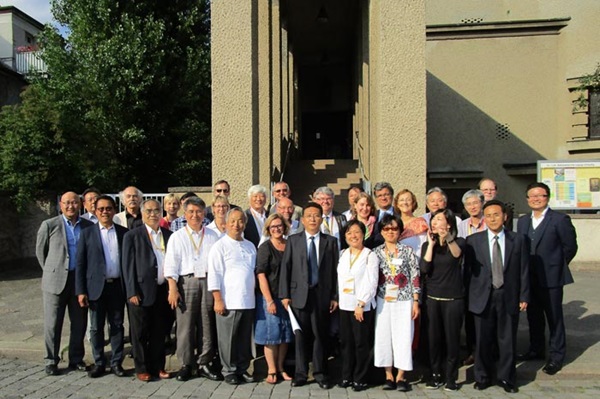As a World Council of Churches-convened forum on peace on the Korean Peninsula came to a close, participants from around the world, representing many churches, vowed to work together in accompanying the Christians of North and South Korea in their efforts for peace, reconciliation, and development.
The World Council of Churches is one of the ecumenical organizations supported by the United Methodist Interdenominational Cooperation Fund, which enables United Methodists to share a presence and a voice nationally and worldwide.
The Ecumenical Forum for Peace, Reunification and Development Cooperation on the Korean Peninsula (EFK) convened in Leipzig, Germany, this Summer, at a time of greatly heightened tensions in the region. EFK participants, in turn, heightened both their hope and resolve for a peaceful outcome.
Thirty-two people from churches and related organizations from North Korea, South Korea and seven other countries took part in the meeting, which was hosted by the World Communion of Reformed Churches (WCRC).
Christine Elliott, director of World Church Programs for Churches Together in Britain and Ireland (CTBI), said: "It is critical at this time of heightened tension around the Korean Peninsula that we challenge the rhetoric of fear and promote a belief in the power of reconciliation and love to build a lasting peace in the region."
At the EFK meeting in Leipzig, participants outlined elements of an advocacy plan they hope will help advance the ecumenical vision of a just, durable and sustainable peace in the Korean Peninsula.
"This plan is a summons to provide platforms and venues for the voice of the Korean peoples, and their struggles, to be heard, loudly and urgently. The world's political and religious leaders must hear our collective voice for the immediate de-escalation of tension in the region to make way for the building of trust that is crucial in the building of a durable peace."
EFK participants agreed that, when peace is threatened, Christians and other people of faith need to be present and active.
Participants named this as the moment for de-escalation, de-militarization, and dialogue.
Many EFK participants reflected that the pilgrimage of justice and peace is a lifelong, worldwide quest not limited to a single meeting or nation.
"We stressed the necessity of an effective advocacy that would make use of the media to demonstrate the faith community's commitment to peace and reunification of Korea and to state with clarity that an alternative path to peace is possible and desired by the Korean people," reflected Rev. Dr Victor Hsu, the Presbyterian Church of Taiwan's outgoing associate general secretary for ecumenical relations..
Bishop Hee-Soo Jung of the United Methodist Church USA, offered a sermon, reflecting: "We who follow Jesus are connected because God has brought us together. We're connected to God, to Jesus, to each other. Our lives are connected – whether we like it or not."
World Council of Churches website
One of seven apportioned giving opportunities of The United Methodist Church, the Interdenominational Cooperation Fund enables United Methodists to share a presence and a voice in the activities of several national and worldwide ecumenical organizations. Please encourage your leaders and congregations to support the Interdenominational Cooperation Fund apportionment at 100 percent.





